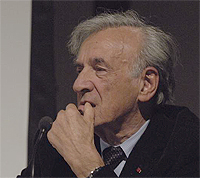Elie Wiesel makes final visit to Auschwitz
UNI professor will appear on "Oprah" Wednesday and Thursday"

This afternoon, thousands of people will accompany University Professor Elie Wiesel on a journey through Auschwitz, the Nazi concentration camp where he and his family were imprisoned during his adolescence.
Wiesel (Hon.’74), Boston University’s Andrew W. Mellon Professor in the Humanities, will appear on The Oprah Winfrey Show today in a segment about what he has called his final trip to Auschwitz, in Poland. Accompanied by Winfrey, Wiesel visited his former barracks at Block 17 and the site of Crematorium III, where his mother and sister were killed. He will be on the show again tomorrow, May 25, to discuss Night, his memoir of his time in the camp, and to meet the winners of a high-school essay contest about the book’s relevance today.
“I was not the same after reading it,” Winfrey has said of Night. “Through his eyes, we are able to witness depths of human cruelty and human grace.”
Winfrey received 50,000 submissions for the essay contest; the 50 winners will appear with Wiesel on Thursday’s show. Other Holocaust survivors, as well as people displaced by the genocide in Rwanda, will also be on the show.
In Night, Wiesel relives his experiences in the Auschwitz and Buchenwald camps, where he was taken in 1944, at age 15, and held until Buchenwald was liberated in 1945. His mother, father, and youngest sister died in the camps.
After his release, Wiesel studied in France and later became a journalist. He has published more than 40 books and has served as chairman of the President’s Commission on the Holocaust, the founding chairman of the United States Holocaust Memorial Council, and chairman of the Elie Wiesel Foundation for Humanity. He received the Nobel Prize for Peace in 1986, in recognition of his work for peace and human rights.
Recently, Wiesel has worked with the Save Darfur Coalition to urge the U.S. government to take action against the government-sponsored militias in Sudan that are responsible for the slaughter of hundreds of thousands.